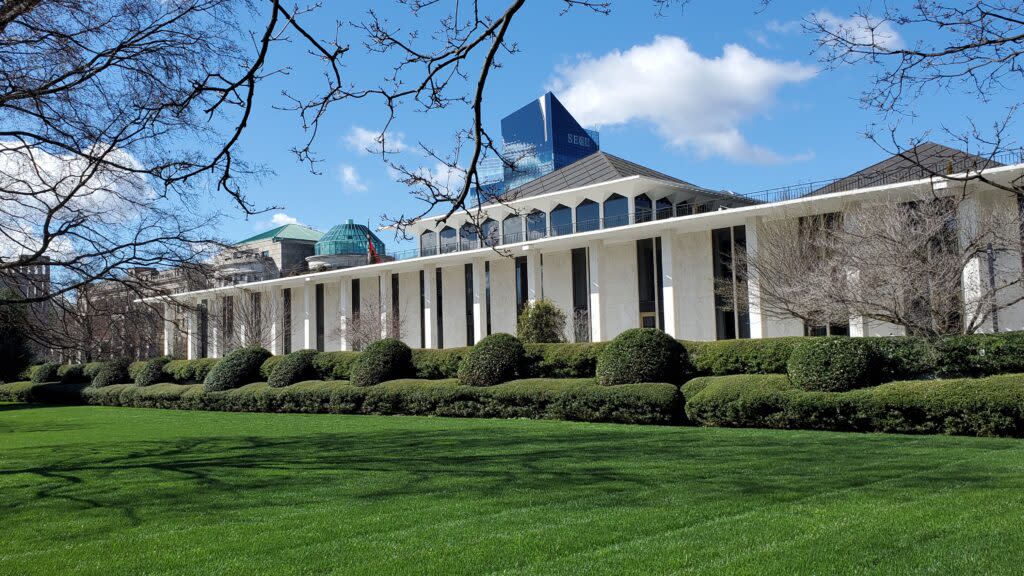NC House and Senate fiddle over minor differences while neglecting the state’s most urgent needs

- Oops!Something went wrong.Please try again later.
The North Carolina Legislative Building in downtown Raleigh (Photo: Clayton Henkel)
North Carolina House and Senate Republican leaders both recently unveiled and passed their state budget proposals for the new fiscal year that begins July 1. And, as has so often been the case over the past decade-plus, the chief immediate result has been a period of intense and potentially destructive bickering.
Despite broad agreement between the two sides to continue the hard right policy agenda they’ve pursued for more than a dozen years, things have quickly gotten divisive and testy over mostly relatively minor matters, like how to use reserves and how tiny of a pay raise to give to teachers and state employees. Indeed, there’s already serious talk in the Legislative Building that both houses may pack up and leave town for much of the summer and simply allow the current two-year budget to continue without significant adjustments.
Interestingly, Gov. Roy Cooper has said he’s not sure that a meltdown of this kind would be such a bad thing. Will Doran of WRAL.com reported that Cooper said, “Both of their proposals are horrible. I mean, they take $625 million just in one year, and put it in taxpayer funded private school vouchers. We could take that funding and provide an 8.5% pay raise for teachers, a $1,500 retention bonus for teachers, plus hire teacher assistants and counselors that they need in our schools and still have money left over.”
Of course, the big problem with the do-nothing approach is that it will leave some big and important problems completely unaddressed.
And topping the list here is the state’s childcare funding cliff that takes full effect at the end of the month. As NC Newsline’s Greg Childress recently reported, the state’s childcare industry is in a state of crisis. Federal COVID relief aid that helped prop the industry up in recent years formally ends June 30 and while many states have stepped up to fill the funding gap — something that even the ultra-conservative NC Chamber has strongly endorsed here — North Carolina lawmakers have remained maddeningly inert.
Both budget proposals would fill part (if not enough) of the gap, but if no final budget agreement emerges very soon, even that will be off the table and childcare centers will start to close in big numbers. Thousands of families, workers and employers will be out of luck at a time of already huge unmet need.
All that said, it’s easy to understand where the Governor was coming from with his comments, as the authors of both the House and Senate proposals managed to be spendthrifts and cheapskates.
Topping the list of wasteful and unnecessary spending, as Cooper observed, is the proposal to lavish hundreds of millions of taxpayer dollars on the state’s flawed and unaccountable private school voucher program — a program that aids the state’s richest residents with tuition payments to private schools, many of which openly discriminate and teach falsehoods about science and history.
The House bill also includes a long list of secretly crafted spending items that will underwrite mysterious causes and/or pet projects of powerful lawmakers, as well as a host of out-of-the-blue “special provisions” to enact new substantive laws. See, for example, a proposal that would require all local boards of education to establish “community media advisory committees” to review challenges to classroom instructional materials (page 58) and a provision that would allot up to $25.2 million to relocate a rural Jones County “maintenance yard” (page 284).
But, of course, if there’s a most glaring hole in both budget proposals, it’s to be found in what they fail to do. At a time of big budget surpluses, neither provides adequate funding for a host of core public structures and services that are struggling mightily.
While the House does slightly better, teacher pay bumps and overall K-12 spending in both proposals are pathetically inadequate – especially at a time in which lawmakers are under a longstanding (and long-ignored) court order in the Leandro case to provide funding for all students to receive the sound basic education to which they are constitutionally entitled.
Likewise, neither proposal takes action to address the chronic state employee shortage that’s left the performance of numerous agencies plummeting, and in many cases, endangered the safety and wellbeing of both employees and the members of the public they serve.
Other shortcomings include:
Low pay and inadequate investments have left state prisons and juvenile justice facilities dangerously understaffed.
Across the state, environmental health problems continue to multiply, even as lawmakers force the Department of Environmental Quality to operate on a shoestring.
State and local election boards remain woefully underfunded, even as lawmakers continue to pile on new laws to administer.
Now add to all of this the continued commitment in both proposals to more regressive tax cuts that favor out-of-state corporations and the rich over average households, and the picture grows even darker.
The bottom line: the competing Senate and House budgets provide plenty of fodder for long and passionate arguments over issues of tremendous importance to the state’s future. Unfortunately, Republican lawmakers who will serve as the ultimate decisionmakers will be otherwise engaged.
The post NC House and Senate fiddle over minor differences while neglecting the state’s most urgent needs appeared first on NC Newsline.

